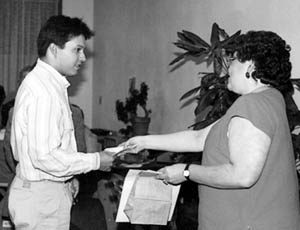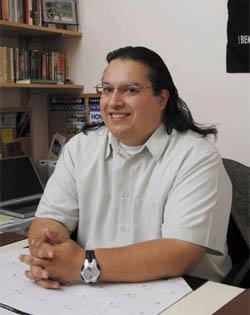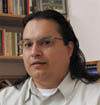|
Oral History - Michael Sámano
Michael was born and raised in Eugene; he describes living in west Eugene as a minority. Michael was familiar with Lane from an early age.
I was born at Sacred Heart Hospital in Eugene, Oregon on March 27, 1964. My mother was born in Portland but raised partially in Monterrey, California, after her mother passed away. Family from outside of Eugene brought her up to Eugene, and my father, who mostly grew up in Mexico City, arrived in Eugene I think around 1961. And they met in Eugene and since I was born in 1964, Eugene still had a citywide housing covenant that stated that minorities weren't allowed to receive home loans through banks. And also, we were supposed to live only in west Eugene. So I grew up in west Eugene. ... I grew up in a pretty diverse background and diverse area relative to the rest of Eugene because those housing restrictions caused all of us to live together. So, when I grew up going to Westmoreland Elementary School and John F. Kennedy Junior High School there was more, maybe, racial and ethnic diversity than other parts of Eugene at that time. And we all just grew up hanging out in the neighborhood and doing what kids do.
My uncle [Jerry Berg] ended up writing a series of books that he ended up using as teaching tools. And I have these early memories of him writing the books because I had an uncle visiting from Mexico for a year. And my uncle ended up being part of that. Like there was a slide presentation that went with at least one of the books and my uncle is in one of these old slides. It's all around cars and fixing cars. Using an interest in cars as a way to get students to be interested in reading and reading comprehension. Also, around that time, this is the early 1970s, my father became a U.S. citizen. And earlier than that, he had been taking English classes. So, the fact that I grew up in Eugene, and LCC just seemed like a reality.
Michael spent four years in the military after high school and began studying at Lane when he returned to Eugene in 1987. Michael became a sociology major and eventually transferred to the University of Oregon to finish his degree in sociology with a minor in ethnic studies.
 Michael began studying at Lane. (MP3, 2:28 min, 2.8MB) Michael began studying at Lane. (MP3, 2:28 min, 2.8MB)
I was motivated to join the military to get money to go to college. ... And then while I was in the military, somehow LCC was on my mind. So that when I got out of the military in July of '83, I immediately came to campus and by the fall '87, I was ready to go. I started taking classes out here, with my sister Debbie, who had just graduated from Willamette High School in June of '87. So, she graduated from high school in June of '87, I came home in July of '87, and then, actually, we were students out here together, and took classes together and shared books and the whole thing.
Here at Lane Community College, I was 23. And I was so excited to be in college. Oh, my goodness! I was so grateful to be out of the military. And, there were some things that had happened in the military, so I think that, as a freshman at LCC, I was wound up pretty tight as a veteran. But, I just had some great, great professors. I mean people that really fulfilled my expectations and my stereotypes of college, where you'd be in a setting where you'd be able to chew on big issues and be forced to think from multiple perspectives. And things that I assumed or generalized or just thought that I knew from common sense were wrong. I just loved that, and I loved being challenged.
I was taking sociology, psychology, history, whatever courses that were really speaking to me. And so it was a combination of cooperative work experience, my own self-reflection of getting out of the military and looking back on the things that I had done or been a part of and not liking that. And also, just the courses. And the next thing I knew, I was dropping computer science and I became a sociology major.

Michael receives an art award from Connie Mesquita, director, Multi-Cultural Center, c. 1988.
|
Michael received an art award in 1988.
There was a poster contest sponsored by the Foundation. The poster was supposed to represent your cultural or ancestral history. My three-panel poster won first place, which was one term's tuition paid!
When Michael attended Lane, his sister and mother also took courses at Lane, and his cousin was on the faculty.
[My sister and I] were freshmen out here together. [We] took a couple classes together. She was 18, and I was 23. She hadn't left Eugene. I had been traveling all over the world. We're brother and sister and we're tight in that way, but, in other ways, I was an older, non-traditional returning student and she was just fresh out of high school. And, so, I think that our experiences were different in that way. ... I look back on that. I felt that the four years that I was in the military I'd missed her high school years. And so in that way it was good for us to be out here as students together.
And then while I was still a student out here my mother and I took a sociology class together one evening. It was a sociology of family course. And so I thought that was kind of neat. And while I was a student out here my cousin [Ted Berg] was still a faculty member out here. So I used to go to his office and sit there and talk to with him. That was just part of the whole package of being a student out here - having family connected to the school.

Michael Sámano, 2004
|
Michael went to graduate school in California and received masters degrees in Sociology from Humbolt State University and the University of California, Davis and began teaching at Sacramento City College. He describes the moment when he knew that he was destined to be a teacher.
I started teaching at Sacramento City College. ... It was the first day of class. It was the first time in my life that I had my own classroom. And I walked in, and I leaned up against the desk that was at the front of the classroom. And right that second, I knew it right that second. It was my calling. It was like a religious calling. That's how strong it was. That I should be in the classroom. And so then, at Sacramento City College in the morning, first day, first class. That was it. Haven't looked back.
Michael returned to Oregon and began teaching at Portland Community College. In 1999 he accepted a position at Lane as coordinator of the ethnic studies program.
 Michael describes the Ethnic Sudies program (MP3, 2:28 min, 2.8MB.) Michael describes the Ethnic Sudies program (MP3, 2:28 min, 2.8MB.)
Ethnic Studies was founded out here on this campus in 1969, even though they didn't call it Ethnic Studies at the time. But I've seen descriptions of old courses and that's what it was. And by 1974 it was just, you know, one of those 'LCC wasn't ready for that type of thing' and there were people that colluded to make Ethnic Studies go away. So when I came in 1999, even though I was hired to create the discipline from scratch. I want to make sure that the people in the past get the props. You know, that what I was really doing was restarting the discipline. I wasn't doing everything. And so, yeah. And now we have this big discipline going on and all these courses that we're offering and other faculty, and we're the only community college in the state of Oregon that has a full-time comprehensive Ethnic Studies discipline. I'm extremely, extremely proud of that. I'm proud of the people that I work with and the support that we have received at the school to have a good strong discipline, proud of my family's support of me and proud of the work I do.
Michael is currently in the doctoral program in the new School of Education at the University of Oregon with a specific focus on the Community College Leadership Program.
If I get through this program, I will weigh my options about someday moving into management or administration, either here or someplace else. And so I'm in the process of writing this new chapter, or giving myself some very interesting options for the future. So…maybe in 20 years I'll be interviewed again as the first student employee president of Lane Community College. Who knows.
Summary of Interview: Total time - 65:20 minutes
| Time/Minutes |
Summary |
| 0:00 |
Family and childhood |
| 4:40 |
Living in West Eugene; minorities in Eugene |
| 9:15 |
Attending elementary school, childhood |
| 12:00 |
Jerry Berg (uncle) teaches at Lane Community College |
| 14:50 |
Graduates from high school; begins writing; takes courses at Lane; serves in the military for four years; returns to Lane |
| 18:40 |
Young adults as students |
| 22:00 |
Studying at Lane |
| 24:50 |
The Lane campus |
| 28:50 |
Memories of music in late 1980s, early 1990s |
| 31:10 |
Courses at Lane - computer science, psychology, sociology, cooperative work experience; wins heritage poster contest |
| 38:00 |
Attends University of Oregon; attends graduate school in Humboldt State University and UC-Davis; begins teaching at Sacramento City College and California State University-Sacramento |
| 39:30 |
Moment when he decides to become a teacher; begins teaching at Sacramento City College |
| 45:20 |
Teaches at Portland Community College; takes position at Lane |
| 48:10 |
Is hired at Lane as Coordinator of Ethnic Studies |
| 50:30 |
Studies at Lane with sister Debbie Sámano and with mother |
| 53:00 |
Works at Lane as coordinator/instructor of Ethnic Studies |
| 54:40 |
Describes typical day at Lane |
| 58:00 |
Describes doctoral program at Oregon State University, Community College Leadership Program |
Return to: Oral History - Sámano Family
|





